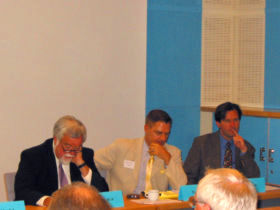
Robert F. Rich, Tom G. Palmer und Stephan Fuchs in
Munich speaking on “The Economics of Knowledge”
A very fine organization, the Council on Public Policy, has released its latest newsletter (in English and in German), which includes a few items involving yours truly (including the conference on “The Economics of Knowledge” in which I participated last July and some discussion of Olaf Gersemann’s Cowboy Capitalism). The Council is directed by an outstanding sociologist and political scientist (or political sociologist), Michael ZÃ?Â??Ã?Â?Ã?¶ller.










Tom: Unfortunately my German is not nearly sufficient to read the text on the Econ of Knowledge conference. I note you were on a panel “Education as Welfare.” What was the gist of it?
I just heard an interview with Clay Jenkinson (“Becoming Jefferson’s People”) where he argued that “free” public education is an essential component of a Jeffersonian society (and endorsed by Jefferson) — in essence because the people are the ultimate constraint on gov’t power, and there’s really no constraint on the people other than their own personal knowledge, wisdom, and ethics.
Any thoughts?
Well, we covered a lot of territory, but the main issues were whether fees should be charged for university education. I presented data on what an astonishing transfer of wealth from the poor to the rich fee-free education is in Germany (despite it’s being promoted as a great leveler) and how fees in other countries generate huge sums of money for higher education; contrary to popular perception, in the US per-student expenditures are much higher than in Germany, with the difference coming, not from the state, but from a combination of fees and voluntary gifts (a great deal of the latter coming from alumni, who don’t generally support their schools in Germany). We also discussed the returns to education and how a great deal of the returns are captured by higher incomes to those who receive the educations, which makes it much harder on utilitarian grounds to justify the state expenditure.
In general, knowledgeable is better than ignorant, but what higher education rarely imparts — and which is of far greater significance than knowledge per se for the maintenance of free institutions — is wisdom. I see little evidence that fee-free schooling has increased the stock of wisdom. On the contrary. Moreover, I see little reason to expect that taxpayer subsidized schooling has increased the knowledge of the public over what it would be without the subsidies or the state monopolization. The work of such scholars as E.G. West, James Tooley, and Andrew Coulson have, I think, at least put the burden of proof on the advocates of state schooling to make their case, rather than simply to assume it.
The Federal Reserve Bank of NY has a research report on the empirical effects of subsidies in higher education on student achievement. The bottom line — the higher the subsidies, the less motivated students are to work, and the less human capital they acquire.
I will look up the cite and make it available to anyone interested.
Charles,
That sounds very helpful. I look forward to it. (If it’s online, can you post the URL?)
Charles just emailed the link to me, so here it is:
http://www.newyorkfed.org/research/staff_reports/sr192.html
The Incentive Effects of Higher Education Subsidies on Student Effort
August 2004 Number 192
JEL classification: D64, D82, I21, I28
Author: AyÃ?Â??Ã?Â?Ã?¸egül Ã?Â??Ã?Â?Ã?¾ahin
This paper uses a game-theoretic model to analyze the disincentive effects of low-tuition policies on student effort. The model of parent and student responses to tuition subsidies is then calibrated using information from the National Longitudinal Survey of Youth 1979 and the High School and Beyond Sophomore Cohort: 1980-92. I find that although subsidizing tuition increases enrollment rates, it reduces student effort. This follows from the fact that a high-subsidy, low-tuition policy causes an increase in the percentage of less able and less highly motivated college graduates. Additionally–and potentially more important–all students, even the more highly motivated ones, respond to lower tuition levels by decreasing their effort levels. This study adds to the literature on the enrollment effects of low-tuition policies by demonstrating how high-subsidy, low-tuition policies have both disincentive effects on students’ study time and adverse effects on human capital accumulation.